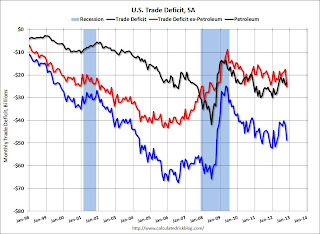The Department of Commerce reported:
[T]otal November exports of $182.6 billion and imports of $231.3 billion resulted in a goods and services deficit of $48.7 billion, up from $42.1 billion in October, revised. November exports were $1.7 billion more than October exports of $180.8 billion. November imports were $8.4 billion more than October imports of $222.9 billion.
The trade deficit was much larger than the consensus forecast of $41.1 billion.
The first graph shows the monthly U.S. exports and imports in dollars through October 2012.
 Click on graph for larger image.
Click on graph for larger image.
Both exports and imports increased in November. US trade has slowed recently.
Exports are 10% above the pre-recession peak and up 3.3% compared to November 2011; imports are near the pre-recession peak, and up 2.5% compared to November 2011.
The second graph shows the U.S. trade deficit, with and without petroleum, through November.
 The blue line is the total deficit, and the black line is the petroleum deficit, and the red line is the trade deficit ex-petroleum products.
The blue line is the total deficit, and the black line is the petroleum deficit, and the red line is the trade deficit ex-petroleum products.
The increase in the trade deficit in November was due to non-petroleum products.
Oil averaged $97.45 in November, down from $99.75 per barrel in October. The trade deficit with China increased to $28.95 billion in November, up from $26.78 billion in November 2011. Most of the trade deficit is still due to oil and China.
The trade deficit with the euro area was $10.6 billion in November, up from $8.2 billion in November 2011. It appears the eurozone recession is still impacting trade.
Note: The trade deficit might have been skewed by the port strike that started in late November.